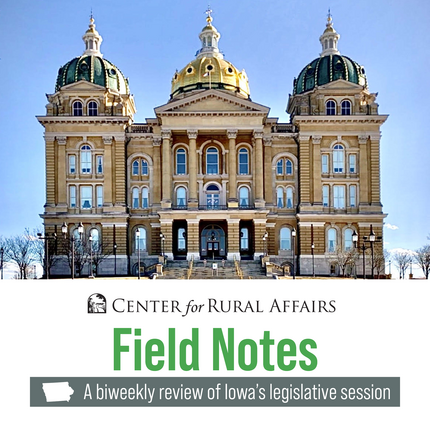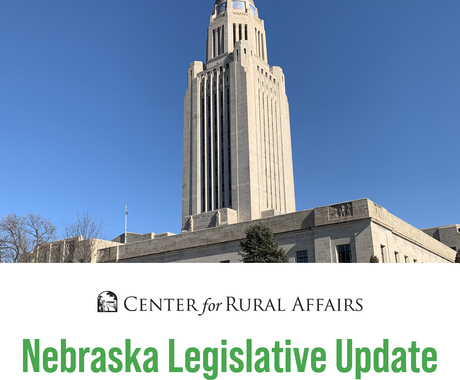The end of the 2024 Iowa legislative session is near. Today, April 16, marks the 100th day of legislative work and is the last day legislators will receive per diem stipends for their time spent in Des Moines.
Tax and appropriation bills are the focus as legislators begin to wrap up business for the year. Meaningful progress was made in the past couple of weeks; however, both chambers must agree on the state’s fiscal year 2025 budget before adjourning.
As committee and subcommittee budgets are released, we are paying close attention to our priorities.
The House Economic Development Appropriations Subcommittee released its budget bill last week. Unfortunately, money for the Grocery Reinvestment Fund and Program and the Local Produce Processing Fund and Program was not included, despite our advocacy efforts in recent weeks.
Many of you may also remember the Butchery Innovation and Revitalization Program passed in 2021. At this time, both chambers have proposed a cut in funding compared to previous years. The House version maintains a portion of the funding, while the Senate version excludes funding altogether. We are tracking the progress of these bills, along with the other committee and subcommittee budgets and associated discussions.
If you have any questions or would like to share the rural issues important to you, please reach out to me at cynthiaf@cfra.org or call 402.687.2100 ext. 1034.
Thank you for making your rural voice heard.
Rural grocery
HF 2599 — Support: Rep. Brian Lohse introduced this bill in the House, and Rep. Chad Ingels has been serving as the floor manager. This Center priority bill would create the Grocer Reinvestment Fund and Program, appropriate money from the general fund, and give the Iowa Economic Development Authority direction to create a grant program for new or current grocery stores located in areas that are both underserved and low or moderate income. The legislation would prioritize cost-saving efforts and business efficiency measures to ensure the long-term sustainability of locally owned grocery stores. Additionally, this bill includes modifications to the Iowa Code under the Local Food and Farm Program. It changes the purpose and goals of the program to include and increase the sale of local food in grocery stores. The bill now is amended to include a local produce processing grant program. Priorities will be given to entities planning to increase the availability, access, efficiency, and capacity of local foods in Iowa. The bill was referred to Appropriations on Feb. 19 after passing through the House Economic Growth and Technology Committee. Unfortunately, it has not moved since nor has it been included in any budget predictions.
Watch: Rural Rapport: Heart of the Community—The Importance of Locally-Owned Grocery Stores
Water quality
HF 2642 (formerly HF 2614) — Monitor: Introduced in the House Agriculture Committee, this bill relates to the conservation and improvement of soil and water resources, including a name change to and restrictions on watershed management authorities (WMAs) in Iowa. The bill would allow soil and water conservation districts to broaden their purview by prioritizing soil health and require WMAs to spend all money for water quality nutrient reduction projects on practices designated by the Iowa Nutrient Reduction Strategy. There is not a companion bill in the Senate. The bill passed out of the House Appropriations Committee on March 6 with approval on party lines. Amendments have been suggested; however, it is unlikely the bill will remain viable this year.
Renewable energy
All of the energy bills we are tracking fell short of the last funnel or were placed under unfinished business. We continue to monitor these as they may come back as amendments to other bills.
Other bills of interest
HF 2641 (formerly HF 2510)/SF 2410 (formerly SF 2209) — Support: Proposed by the Iowa Department of Agriculture and Land Stewardship, this legislation relates to programs and regulations administered by the department. The Center supports two key components of the bill. The Choose Iowa Promotional Program provides consumers an opportunity to purchase food originating in the state, which is designated with the Choose Iowa logo. This legislation also creates the Value-Added Grant Fund and Program, which supports projects and services that add value to agricultural commodities produced in Iowa. Amendments were offered to the House bill ahead of debate, and one section added was specific to hemp regulation. The House version passed on the floor as amended on April 10. It is awaiting action in the Senate and is attached to its companion, SF 2410.
HF 2257 — Support: Proposed by the Iowa Department of Agriculture and Land Stewardship, this legislation proposes an amendment to the Meat and Poultry Inspection Act. The amendment would allow poultry processors to engage in custom operations if they maintain their state-licensed inspections. All packages processed on a custom basis must be marked “not for sale” and kept identified until the owner picks up the order. The House version of the bill passed unanimously through floor debate on Feb. 26. The Senate passed the same language unanimously on March 19. The bill is awaiting the governor's signature.
HF 2674 (formerly HSB 722) — Support: Introduced by Chairperson Bobby Kaufmann on the Ways and Means Committee, this bill relates to tax credits being awarded by the Iowa Economic Development Authority for capital contributions made to the Certified Rural Business Growth Fund for investments in qualified businesses. Limits are being offered for who can receive money from the fund. It should support rural communities across the state of Iowa. The bill passed the House Floor with unanimous consent. It was sent to the Senate, passed through subcommittee, and is awaiting consideration by the Senate Ways & Means Committee.
HF 2682 — Monitor: This bill was introduced by the Committee on Ways & Means. It updates the definition of a food processing plant to include operations located on a farm or private residence. Licenses for those businesses require a fee and the bill provides the parameters. The bill passed the House floor unanimously on April 8 and is now awaiting consideration in the Senate.




